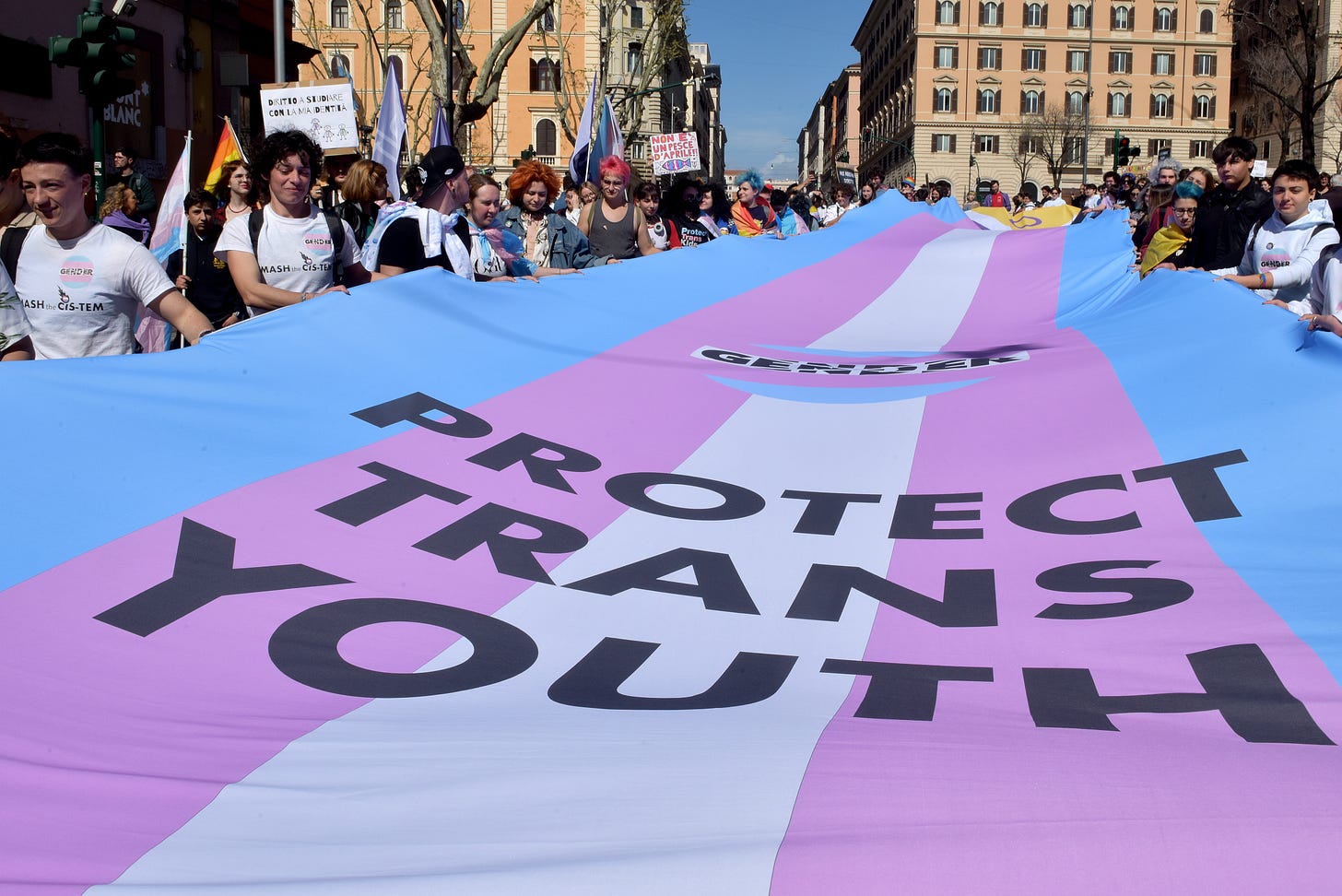Stop It
Attacks on the transgender community
We are facing many threats and challenges to our nation’s prosperity and security. These include a belligerent China, the war in Ukraine, economic disruption, our global climate crisis, and even the specter of artificial intelligence, just to name a few.
These are the issues government should be debating and legislating.
And yet Republican statehouses and Fox News would have you believe our greatest threat is drag queen reading hour.
It’s meant to be a divisive distraction.
It's lunacy, but it is also a dangerous injustice. And a tragedy.
You can tell a lot about a society by how it treats its most vulnerable, marginalized, and ostracized.
History is replete with the horrors inflicted by those who wielded the power of position and privilege against those who had little to none of either. Persecution has taken many forms — legal, cultural, economic, and social. It has led to unimaginable suffering, violence, and death — even reaching the scale of genocide.
About this, there are many lessons from the past to be heeded. Divisive hatred should be called out and rebuffed. And it is especially incumbent on those outside the group being persecuted to stand in meaningful solidarity. An attack against one segment of society is an attack against all whose existence might challenge a narrow definition of what is considered “acceptable.”
Right now, few groups face more direct hostility than the transgender community. There is a wave of animus sweeping the nation. It is being codified into law, wielded as invective, and used as a springboard to violence.
This divisiveness and scapegoating pose a threat to our ideals. And thus they are a threat to all who care about freedom in a pluralistic constitutional republic based on the principles of democracy.
More fundamentally, those under attack are fellow human beings who deserve the same respect and opportunity to live their lives as anyone else.
There are a lot of reasons bigots are focusing their hatred on transgender people. Gender fluidity is a concept foreign to how many were raised, and thus it can be disorienting to comprehend. It challenges the binary many of us learned as children and believed to be utterly fundamental.
“What did you have?” is often the first question new mothers are asked from family and friends. And the implications of the query are understood even if they go unstated: Did you have a boy or a girl?
It is also understood that the implications of that question will endure far beyond infancy. Gender is seen as portentous for what the rest of life will entail. There was a time when biological sex determined everything from one’s likely occupation to one’s legal rights. Boys and girls have different aisles in toy stores and sections in clothing departments.
In many ways, we have made progress toward gender equality. We have women in positions of political power and leading businesses. We have women firefighters, police officers, and pilots. But we also still have a ways to go. And the recent rollback of abortion rights shows we are capable of losing ground.
Into all of this complexity comes the rise in trans awareness and its backlash. While it is understandable that children and adults who do not fit into a traditional gender overlay could be a challenging reality for many, we should be clear that this makes it all the more important that we try to understand.
Science informs us that gender is often a blurry concept in nature. History proves that transgender identities in humans are not new. We can gain understanding from medical and mental health professionals about responding with care and empathy.
And we should be clear that claims of “this is abhorrent,” “this isn’t how things should be done,” “this isn’t natural,” or “this is dangerous” are the kind of rhetoric long used to attack the “other,” no matter who it may be.
We have seen these attacks lobbed at other members of the LGBTQ community. We have seen them target interracial marriage, the customs of non-Christians, and communities of immigrants.
We have seen discrimination wielded time and again as a cudgel for those with power to bolster their standing by picking on others. It is bullying, pure and simple.
The attacks on drag queens and others in transgender communities as “groomers” or prone to child abuse are particularly despicable. There is no evidence backing these allegations. And those who push them are often conveniently quiet about those who have been prosecuted for abuse but belong to groups more aligned with conservative values, like the clergy, Boy Scouts, and even Republican politics (former House Speaker Dennis Hastert comes to mind).
The purpose of these attacks on the trans community is transparent. It’s about political power, and a power built on division. It’s about picking on those who have the least ability to defend themselves, including and especially children.
We can try to wrestle in good faith around the implications of a changing society. We can discuss what this might mean for sports or bathroom design. We can be sympathetic to those who are still early in their journey of understanding.
But as history has shown, we should not be quiet. We should not look the other way. We should not allow this hatefulness to take root and distract us from the real problems with which we must contend.
Those who are being targeted must know that they are not alone.
Note: We’re deeply thankful for the Steady community. If you aren’t already a member, please consider subscribing. Both free and paid options are available.


Mr. Rather, thank you so much for speaking out. I can't adequately describe the feelings of terror and loneliness in the trans community right now. It's pretty scary. Your words here will go a long way toward fighting the attempts to dehumanize us.
Very well said, Dan. Thank you. It's as if the most malignant of high school bullies have been let loose upon our society.